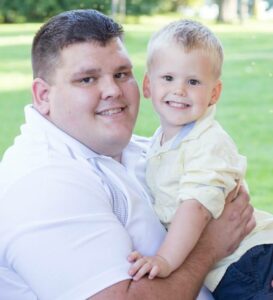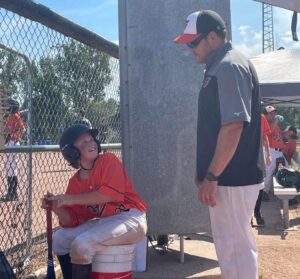Ian Patton is a big guy – and leaning into his size has been part of his success strategy as far back as second grade. But it’s been a rocky road. He entered school as a chubby kid, and pretty soon he was the target of jokes and teasing. “By grade 2, I was fully aware that I was defective,” he deadpans nowadays, when describing his journey with obesity, “and I was bullied accordingly.”
There were mean nicknames like Fatty and Tubby. “Or my favorite: Fatton Patton,” he says. “It got creative!” But it also got worse. “The first time I took a beating in school, I did what you are supposed to do – I went and I told the teachers,” he recounts. “But because they didn’t see the assault, it was my word against theirs and it was an ‘unpunishable offense.’”
The humiliations continued at Ian’s expense, so he appealed to a higher authority: Dad. Ian’s father took a meeting with school administrators and laid it out – either you take care of this, or Ian will. So, Ian was granted permission from Dad to fight back if it happened again. It did, and he did. “One bully corrected with a bloody nose, and things changed for me drastically,” says Ian.

Ian with His Son
Thus was born Ian’s success strategy. He continued to lean into his size. “From that point on I sought out sport and excelled. My size was actually revered in some cases,” he says. He distinguished himself as a freestyle wrestler in high school, where being the biggest was an advantage. The old taunts were supplanted by new nicknames like Moose and Tank.
So much has changed since those times but one thing hasn’t: weight bias. Ian wants his kids – son Declan, 12 and daughter Sawyer, 10 — to grow up in a world where “body diversity is accepted.” And he’s working to shape that world.
Ian is Director of Advocacy and Public Engagement at Obesity Canada (OC), one of the leading charities working to improve the lives of people living with obesity. He became involved with the organization while he was studying kinesiology and childhood obesity – continuing a pathway informed by his experience as a child and an athlete. In his role at OC, he works to raise awareness of obesity as a chronic disease, and educates people living with obesity about how to get the proper medical care to manage their condition.
After completing his undergraduate degree Ian’s athletic endeavors tapered off and his weight escalated dramatically. At his biggest, at 29 years old, he was over 350 pounds, he remembers. He felt really unwell, as if the “fat were just sucking the life out of me.” And it kind of was. He had high blood pressure and severe sleep apnea – both of which can lead to even worse health consequences. He knew he had to do something dramatic, and do it soon. There was another big reason driving his fears, too – he was a new father. He wanted to be around for his family. His son was just an infant and Ian didn’t want little Declan to know him “as the horrifically swollen version of myself that I saw myself as… If I could sort this out and lose the weight soon enough, he would never remember me as ‘fat dad’.”
As a scientist and academic, Ian took a deep dive into obesity management – and the treatment with the best track record was gastric bypass surgery. Despite the risks any surgery poses, he thought the procedure held the most promise for him.
Ian describes his surgery, which he had in 2014 at age 29, as truly life-altering. He lost 130 pounds over the following year or so, and his health improved greatly. He was able to get off of blood pressure medication and put away his CPAP machine. But the road to better health after bariatric surgery isn’t a straight one by any means. The body eventually adapts to its new digestive system, and some weight regain is inevitable. In the early months after surgery Ian never even thought about food much.

Ian with His Son and Daughter
But that changed, and what he calls his ”food brain” came back with a vengeance. “It was all-consuming. It took over my life and it was like just an incredible drive. It was the only thing,” he remembers. “I’d wake up in the morning and my brain was thinking food, food, food.” Battling against this compulsion 24/7 was exhausting – not to mention dealing with the shame of wanting to sneak food past his family, and the disappointment of falling off the healthier path he’d set for himself. “I tried every day to eat less and to get control of it,” Ian explains, “but when it’s the only thing that is driving your brain, your willpower wears out.”
Dealing with a chronic condition is complicated, and Ian stresses that it just can’t be done alone. Before his surgery Ian had lost and regained over 50 pounds on successive tries by forcing himself into strict diet and exercise regimens. “I definitely had a macho attitude toward my obesity – like I should be able to handle this, I should be able to go to the gym and make this work,” he says.
He knows that for men, it’s especially hard to ask for help. But he has a message for men who are dealing with excess weight – one which may seem ironic given his grade school experience: “You don’t always have to be the big, tough guy.” Ian says it was only when he sought help that he was able to take charge of his condition. And it was a huge relief when he finally did. “It was definitely almost freeing,” he recalls. “It almost gave me a sense of freedom to realize that this wasn’t all on me.”
Since the surgery, Ian says cognitive behavioral therapy has helped him in “understanding that there’s parts of this that I don’t have full control over, and I just need to be able to focus on the things that I can [control].” Now he also uses anti-obesity medication to help quiet his “food brain.”
Nearly ten years out from his surgery, Ian describes his health and weight as “comfortable and steady.” Over the past decade, Ian has learned a lot about the disease of obesity, and he is better able to cope with difficult times. “I still fall off the wagon. I still have rough spots,” he says, “but they are much less impactful than what they used to be.”
And Ian’s fear of being “fat dad” never materialized. Instead, he’s actively involved with his athletic kids. He’s coaching Declan’s baseball team, and during hockey season he’s out on the ice with the teams of either Declan or Sawyer most days of the week.
Ian’s professional work is just as satisfying – and he’s still leaning into his strengths as a person in a larger body. He is helping educate other people living with obesity about their rights to effective medical care. He’s empowering them to get the help they need to be their best and healthiest selves.

Ian Coaching His Son’s Baseball Team
***
Diet and exercise alone aren’t enough to help many people reach a healthier weight. Medical treatments are needed to address the biological changes happening in our bodies that can drive weight regain. To find a physician near you who specializes in weight management, click here.
Get a weekly text to help you stay on track with your health goals! Click here to sign up.
This article was sponsored by Novo Nordisk Canada. All content is created independently by My Weight – What To Know with no influence from Novo Nordisk.

